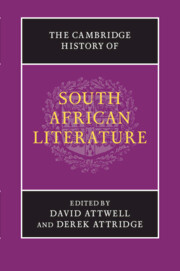Book contents
- Frontmatter
- Introduction
- PART I ORATURES, ORAL HISTORIES, ORIGINS
- 1 ‘The Bushmen's Letters’: |Xam narratives of the Bleek and Lloyd Collection and their afterlives
- 2 A contextual analysis of Xhosa iimbongi and their izibongo
- 3 ‘I sing of the woes of my travels’: the lifela of Lesotho
- 4 Praise, politics, performance: from Zulu izibongo to the Zionists
- 5 IsiNdebele, siSwati, Northern Sotho, Tshivenda and Xitsonga oral culture
- PART II EXPLORATION, EARLY MODERNITY AND ENLIGHTENMENT AT THE CAPE, 1488–1820
- PART III EMPIRE, RESISTANCE AND NATIONAL BEGINNINGS, 1820–1910
- PART IV MODERNISM AND TRANSNATIONAL CULTURE, 1910–1948
- PART V APARTHEID AND ITS AFTERMATH, 1948 TO THE PRESENT
- PART VI SOUTH AFRICAN LITERATURE: CONTINUITIES AND CONTRASTS
- Index
- References
4 - Praise, politics, performance: from Zulu izibongo to the Zionists
from PART I - ORATURES, ORAL HISTORIES, ORIGINS
Published online by Cambridge University Press: 28 January 2012
- Frontmatter
- Introduction
- PART I ORATURES, ORAL HISTORIES, ORIGINS
- 1 ‘The Bushmen's Letters’: |Xam narratives of the Bleek and Lloyd Collection and their afterlives
- 2 A contextual analysis of Xhosa iimbongi and their izibongo
- 3 ‘I sing of the woes of my travels’: the lifela of Lesotho
- 4 Praise, politics, performance: from Zulu izibongo to the Zionists
- 5 IsiNdebele, siSwati, Northern Sotho, Tshivenda and Xitsonga oral culture
- PART II EXPLORATION, EARLY MODERNITY AND ENLIGHTENMENT AT THE CAPE, 1488–1820
- PART III EMPIRE, RESISTANCE AND NATIONAL BEGINNINGS, 1820–1910
- PART IV MODERNISM AND TRANSNATIONAL CULTURE, 1910–1948
- PART V APARTHEID AND ITS AFTERMATH, 1948 TO THE PRESENT
- PART VI SOUTH AFRICAN LITERATURE: CONTINUITIES AND CONTRASTS
- Index
- References
Summary
As South Africa hurtled towards its third national democratic election in 2009 an old anti-apartheid struggle song jostled with poetry and songs from the long oral tradition to bolster the public images of politicians. At rallies the leader of the largest political party led supporters in singing ‘Umshini wami’ (‘My machine [gun]’), a song with a long career in the underground camps of the liberation struggle. The song was imbued with new meanings and sung with relish by those seeking to voice popular dissatisfaction with the perceived failures of the state and of political leadership (Gunner, ‘Jacob Zuma’, pp. 28, 30). The same song had in the preceding months been transformed into countless cellular telephone ringtones by entrepreneurs seeing a popular cultural phenomenon out of which to score sales. Sound and video clips of singing crowds were also heard and seen on radio and television. At the same time debate raged under trees, in offices, on numerous blogs, news websites, and on radio and television talk shows about the public uses of a song with an illustrious history of galvanising fighters for justice by a politician whose post-liberation character was allegedly dubious. To add to the maelstrom of reinvented cultural idioms and symbols, some of the politicians were being lauded in praise poetry, izibongo, and songs in the maskanda genre performed at live concerts. The poetry and music were recorded and disseminated through fast-selling compact discs.
- Type
- Chapter
- Information
- The Cambridge History of South African Literature , pp. 77 - 94Publisher: Cambridge University PressPrint publication year: 2012
References
- 1
- Cited by

